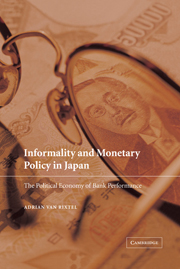Book contents
- Frontmatter
- Contents
- List of figures
- List of tables
- Acknowledgements
- 1 Introduction
- Part I Theory
- 2 The political economy and economic system of Japan: A survey of literature, conflict and confusion
- 3 Informal aspects of Japanese economic policy
- 4 Informality and monetary policy: an operational framework
- Part II The institutions and their policies
- Part III Empirical evidence
- Bibliography
- Index
2 - The political economy and economic system of Japan: A survey of literature, conflict and confusion
Published online by Cambridge University Press: 22 September 2009
- Frontmatter
- Contents
- List of figures
- List of tables
- Acknowledgements
- 1 Introduction
- Part I Theory
- 2 The political economy and economic system of Japan: A survey of literature, conflict and confusion
- 3 Informal aspects of Japanese economic policy
- 4 Informality and monetary policy: an operational framework
- Part II The institutions and their policies
- Part III Empirical evidence
- Bibliography
- Index
Summary
Whatever may be said about Japan, the opposite may also be true.
L. Hollerman (1988)Introduction
As President Kennedy already knew, success has many fathers and failure few. By almost any economic standard, the post-war economic development of Japan can be characterised as a success. Very few industrialised countries boast a similar persistent combination of low unemployment, low inflation and high economic growth. Not surprisingly, this success has become the main topic of many studies in economics, and in other disciplines such as political science and sociology as well. Various theoretical schools try to claim success by declaring it in accordance with their own analytical frameworks and resulting conclusions. Consequently, as will be argued in this chapter, the field of Japanese economic studies has become a battleground of academic conflicts, characterised by significant polarisation and politicisation. These conflicts result mainly from prevailing differences of opinion regarding two fundamental issues.
First, Japanese economic studies have, like other fields in economics, been hit by the controversy between activist and non-activist policies, the contrast between belief in government intervention and faith in the free market (Schmiegelow 1986b, p.ix; Morris-Suzuki 1989, p. 195; Itoh 1990, p. 159). This debate will be clearly reflected in section 2.3 in the opposing views of the interventionist and market schools, with the interventionists drawing the conclusion that the alleged successful Japanese experience with industrial policy offers important lessons not only for developing countries, but for the industrialised world as well.
- Type
- Chapter
- Information
- Informality and Monetary Policy in JapanThe Political Economy of Bank Performance, pp. 11 - 32Publisher: Cambridge University PressPrint publication year: 2002



